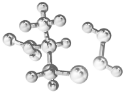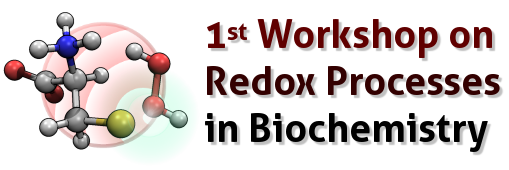
1st Workshop on Redox Processes in Biochemistry
 |
May 21-22, 2014
São Paulo
Brazil
Instituto de Química
Universidade de São Paulo |
May 21st–22nd | Instituto de Química | USP
Redox Processes involve the production of oxidizing and reducing species and their reactions with proteins, lipids or nucleic acids. The Redox Processes in Biochemistry course will focus on the understanding of how oxidizing and reducing species are formed in biological systems, and how redox-modified biomolecules alter physiological responses in cells. There will be discussion on the reaction mechanisms of redox species with biomolecules and the consequence of their reactions with specific targets, such as those involved in cell signal transduction and antioxidant responses. The advantages and pitfalls of the most recent methods for detection of reactive oxygen species and their post-translational modification of biomolecules will also be debated.
Registration to participate in the workshop will be available from 1 to 30 April, 2014.

Location
Anfiteatro Cinza – bloco 06 (piso superior)
Instituto de Química – Universidade de São Paulo
Av. Prof Lineu Prestes, 748 – Butantã
São Paulo – SP, Brazil
Videoconference
The workshop will be available by videoconference only for Redoxoma network members. Registration is also required.
Flavia Carla Meotti
Assistant Professor – Department of Biochemistry
Institute of Chemistry – University of São Paulo
São Paulo, Brazil
http://www2.iq.usp.br/docente/flaviam
Sayuri Miyamoto
Assistant Professor – Department of Biochemistry
Institute of Chemistry – University of São Paulo
São Paulo, Brazil
http://www2.iq.usp.br/docente/miyamoto
Wednesday | 21st May 2014 | Afternoon
14:00 - Marcelo Bonini
(University of Illinois at Chicago, USA)
Nitrosation of suppressor of cytokine signaling by NOS1 is a critical initiation step of the inflammatory process triggered by TLR4 activation
15:00 - Denise Fernandes
(InCor/FMUSP – Universidade de São Paulo, Brazil)
NADPH oxidase Nox1 activation by protein disulfide isomerase gain-of-function in vascular cells
16:00 - Coffee Break
16:30 - Technical seminar on mass spectrometry
Seminário técnico em espectrometria de massas
Thursday | 22st May 2014 | Morning
9:00 - Albert Girotti
(Medical College of Wisconsin, USA)
Formation, translocation and reductive turnover of lipid hydroperoxides in biological systems
10:00 - Sayuri Miyamoto
(IQUSP – Universidade de São Paulo, Brazil)
Lipid-protein interaction studies involving cytochrome c and cholesterol hydroperoxides and aldehydes
11:00 - Coffee Break
11:30 - Andres Trotchansky
(Universidad de la República, Uruguay)
Mechanisms and biological consequences of lipid oxidation and nitration
Thursday | 22st May 2014 | Afternoon
14:00 - Madia Trujillo
(Universidad de la República, Uruguay)
Mycoredoxina/mycothiol, analogous of glutathione/glutaredoxin, as peroxiredoxin reducing agentes in Mycobacterium tuberculosis
15:00 - Ari Zeida
(University of Buenos Aires, Argentina)
Molecular basis of thiol oxidation by peroxides
16:00 - Coffee Break
16:30 - Luis Eduardo Soares Netto
(IBUSP - University of São Paulo, Brazil)
Unique properties of Ohr enzymes: structure, biochemistry and phylogenetic distribution
Albert Girotti
Medical College of Wisconsin, USA
Albert Girotti is a Full Professor at the Biochemistry Department, Medical College of Wisconsin. He has a longstanding interest in the pathologic as well as therapeutic effects of oxidative stress, including photodynamic stress used in anti-cancer photodynamic therapy (PDT). For quite some time, the special focus of his work has been on the generation, translocation, signaling action, and detoxification of lipid oxidation products, particularly lipid hydroperoxides. His group, including visiting academic collaborators, postdoctoral fellows, and graduate students, has contributed steadily in these areas over the past 30 years with NIH/NCI support. Much of his recent work has focused on biochemical factors that influence PDT effectiveness, e.g. effects of lipid hydroperoxide-detoxifying selenoperoxidases, and pro-oxidant vs. antioxidant effects of iron vs. nitric oxide (NO).
http://www.mcw.edu/biochemistry/faculty/Albert_Girotti.htm
Andres Trostchansky
Universidad de la República, Uruguay
Andres Trostchansky is an Associate Professor at the Department of Biochemistry, School of Medicine, University of the Republic, Montevideo, Uruguay. His research has been focused on the biological properties of nitro-fatty acids (NFA). In particular, the modulation of key inflammatory enzymes, COX-1, COX-2, NOX2 and PDI by a novel nitroalkene, nitroarachidonic acid (AANO2).
Ari Fernando Zeida Camacho
University of Buenos Aires, Argentina
Ari Fernando Zeida Camacho is a PhD student, with a CONICET (National Research Council of Argentina) fellowship at the Department of Inorganic Chemistry, Physic-chemistry and Analytical Chemistry, University of Buenos Aires. His research approach comprehends experimental and computational studies of thiol oxidation by peroxides. Specifically, the proposal is focused in obtaining a microscopic understanding on the catalytic ability of peroxiredoxins and their differential reactivity towards different peroxides. A combination of experimental and theoretical techniques is being performed in order to tackle these questions.
Denise de Castro Fernandes
InCor/FMUSP – Universidade de São Paulo, Brazil
Denise de Castro Fernandes is an Associated Researcher at the Laboratório de Biologia Vascular, Instituto do Coração (InCor - HC/FMUSP), Universidade de São Paulo. Denise’s expertise involves the Biochemistry of the Vascular System. Her research interests focus on the production of reactive nitrogen species, the mechanisms of function of NADPH oxidases and thiol-containing proteins, shear stress and the integration of endoplasmic reticulum oxidative stress and vascular dysfunction.
Luis Eduardo Soares Netto
IBUSP - University of São Paulo, Brazil
Luis Eduardo Soares Netto is a Full Professor at Departamento de Genética e Biologia Evolutiva, Instituto de Biociências da Universidade de São Paulo. He is interested to understand the mechanisms of cell defense against free radicals and related species. Therefore, his group investigates a family of proteins named peroxiredoxins, which includes the thioredoxin peroxidases. His research extents the chemistry and biology of thioredoxins, glutaredoxins, peroxiredoxins and glutathione using Saccharomyces cerevisiae as model. He is also interested in the antioxidant mechanisms of pathogenic bacteria like Xylella fastidiosa, Chromobacterium violaceum and Pseudomonas aeruginosa. The projects developed in his lab has contributed to the characterization of a new class of antioxidant enzymes, Ohr (Organic Hydroperoxide Resistance protein), which are purposed to have an important role pathogen infection.
http://genoma.ib.usp.br/?page_id=1226&lang=en
Madia Trujillo
Universidad de la República, Uruguay
Madia Trujillo is an Associate Professor at the Department of Biochemistry, School of Medicine, Universidad de la República, Uruguay. Dr. Madia Trujillo group has enormously contributed to the study of kinetics and mechanisms of peroxides detoxification in biological systems. She has focused in the reaction of peroxynitrite with proteins, including peroxiredoxins. Currently, her main research interest is the study of kinetics and mechanisms of thiol-based antioxidant systems of pathogenic intracellular bacteria and parasites.
Marcelo Bonini
University of Illinois at Chicago, USA
Marcelo Bonini is an Assistant Professor at the Departments of Medicine, Pharmacology and Pathology, College of Medicine, University of Illinois at Chicago and Visiting Professor at Universidade Estadual de Maringa. His research interests focus on the mechanisms and consequences of reactive oxygen species production both acutely in physiological preconditioning and in prolonged activation of pathologic signaling in disease. Currently, his laboratory is focused on the understanding of the mechanisms involved in the metabolic reprogramming of cancer cells and in the redox regulation of inflammatory signaling mediated by suppressor of cytokine signaling-1 (SOCS-1). The laboratory has a strong translational focus involving the discovery of signaling pathways involved in disease, the conceptualization and synthesis of pharmacologic compounds and the development of therapeutic approaches in animal models of human pathologies.
http://www.uic.edu/depts/mcph/falc_bonini.htm
Sayuri Miyamoto
IQUSP – Universidade de São Paulo, Brazil
Sayuri Miyamoto is an Assistant Professor at the Department of Biochemistry, Institute of Chemistry, University of São Paulo, Brazil. Her research investigates the formation, reactivity and biological effects of potentially bioactive products generated by the interaction of lipids with reactive oxygen species. For this purpose she uses several chemical/biochemical analytical tools including highly sensitive LC-MS/MS techniques. Currently, she is focused on the oxidized products formed from lipids found in abundance in the central nervous system. Her major goal is to understand the role of lipids and their oxidation products in physiological and pathological processes, particularly in neurodegenerative diseases.
http://www2.iq.usp.br/docente/miyamoto/
 |
1st Workshop on Redox Processes
in Biochemistry
May 21st and 22nd
|
 |
Av. Prof. Lineu Prestes, 748 - Butantã
São Paulo, SP, Brazil - 05508-000
|







